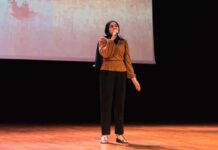TikTok has made reading trendy again and a variety of factors have caused teenagers in the UAE to flock to local book stores.
By Zahra Rashid
“Sorry, it’s sold out.”
It was a Saturday evening in the United Arab Emirates’ largest bookstore. A teenage girl was at the customer service desk with the “Favorites” folder on Tiktok open on her phone. She paused through several book recommendation videos as she asked the employee if certain books were in stock.
Much to her dismay, many were not.
“We’ll give you a call when we get more copies in a week’s time,” the customer service representative said.
She sighed.
With a quick scribble of her number on a piece of paper and a murmured “thank you,” the girl walked back to join her friends, who were seated on the floor in a corner of the store. Piles of the most popular books from TikTok surrounded them as they discussed which ones were worth the hype and which they should purchase.
The cashier queue was more than 15 people long by the time they had chosen their books.
I have been an avid reader since childhood, frequently visiting bookstores in Dubai, although I had never seen a sight quite like this before.
“It is all because of BookTok,” said a Borders bookstore employee Roma Masilungan.
A sub community or niche on the app TikTok, BookTok focuses on videos relating to books and literature. These include recommendations, reviews, reactions, skits, memes, fan casts and so much more. The hashtag currently has 47.5 billion views, with more than 83,000 from the UAE.
Masilungan has been working in customer service at Borders for approximately six years and said there have been many young people specifically inquiring about popular books on the app since 2020.

She also noticed that this trend is most common amongst teenage girls and particularly about books written by Colleen Hoover.
“It Ends With Us,” for instance, is Hoover’s most viral book and has been on the bestseller lists at both Kinokuniya and Borders since 2021.
The number of questions were so many that they created an entire shelf and multiple tables at the entrance of the store dedicated to trending books on TikTok, which made it easier for customers to find them.
Lubna Abdul Aziz, a creator on BookTok and a UAE resident, said she doesn’t think there is a bookstore in the world today, both large and second-hand, that doesn’t have a dedicated section to these popular books.
“They recognize it’s [TikTok’s] power and want to use it to their advantage,” Abdul Aziz said.
Many customer service employees at bookstores echoed this, adding that they see TikTok in a positive light: as a marketing platform for their books or a way to attract sales.
Aizza Quinones, who has been working at Borders for over seven years, said that “the book related videos are great for marketing to young people.”
So, what exactly converts a viewer on Tiktok into a buyer and reader at a bookstore?
Conformity is one of the main factors that affects this, said Suraksha Mukesh, an avid reader and UAE resident.
“People, especially young girls, want to conform to the norms and the trends on TikTok to feel accepted,” she said.
The “it girl” trend is a prime example of this, where many female creators will post videos of the books they read along with their aesthetic lifestyle. This content promotes the idea that if others do not have the same taste in books or lead the same life, they are not of the same value and do not fit in, Mukesh said.
This had an influence on her as well, since she bought books about self help or feminism solely because it was trendy and her favorite BookTokers were reading them.
Moreover, the “For You” page on TikTok is highly personalized to each user; thus, there is more of a sense of intimacy and trust between audience and creator in comparison to a platform such as “Goodreads.”
Mukesh highlighted that she feels the creators are speaking to her directly when they are recommending books.
“I’ve never intentionally searched up book related videos, but it is as if the creators know what type of books I would like.”
As a result, she felt that there was a corner of TikTok that was a community of similar readers that could share their opinions in the comments section, relate to each other and gush over the books they love together.
“I even joined a discord server that I found on TikTok with readers, and we would all talk about our favourite books or recommend some to each other.”
Abdul Aziz felt the same way.
“As a BookTok creator, I love seeing the comment section of my videos filled with people talking to each other, making friends and connecting over something so universal: reading,” she said.
When checking her analytics, Abdul Aziz also realized that her most viral videos are short funny ones about book jokes; however, her most saved and shared videos are the longer videos such as book reviews or hauls.
“I feel like I can connect with my audience more if I am talking to them directly. These are the videos I personally love to watch as well.”
Mohadessa Meherali, another reader and local resident, agreed with this. In her opinion, the most attractive videos were ones that had a summary of the book as well as how the creator honestly felt about it, without the unnecessary hype.
“I also think videos on books written by authors of color, or those that contain diverse characters are very likely to be popular on TikTok,” she said.
Meherali emphasized that the BookTokers on the platform “are often critical readers and quickly spot hidden biases or problematic ideas.” However, they also give the authors credit where credit is due, which she finds to be a wonderful balance.
“BookTok has made some great progress in helping readers diversify their shelves. I myself took a step back and thought ‘damn that’s a lot of white authors on my shelf’.”
Abdul Aziz is a hijabi, and as a physically Muslim creator, she thinks she has a role to play in adding to this diversity on BookTok.
“People in the region are able to relate to me more and therefore be more trusting of my recommendations.”
She said that she enjoys reading and sharing books with Muslim leads and positive representation of Islam.
Mukesh added that because of this, she was finally able to identify with main characters in a book after looking for diverse representation ever since she was a child.
“I don’t think I will ever go back to traditionally buying books. The list of book recommendations from Tiktok in my notes app is ever growing and will remain with me forever.”


















